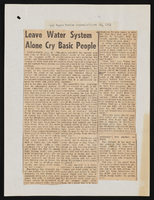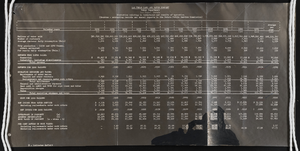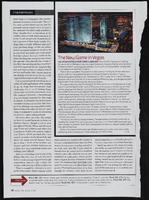Search the Special Collections and Archives Portal
Search Results
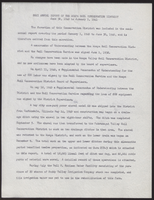
Semiannual report of the Moapa Soil Conservation District, from June 30, 1940 - January 1, 1941
Date
Archival Collection
Description
Summary of the work of the Moapa Soil Conservation Service for the last half of 1940.
Text
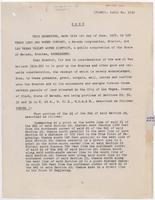
Deed for nine specific parcels of land, Las Vegas Land and Water Company to the Las Vegas Valley Water District, Audit No. 5350, June 1, 1954
Date
Archival Collection
Description
Deed of the land sold to the Las Vegas Valley Water District from the Las Vegas Land and Water Company, except for the water right reserved in Helen Stewart's deed. Notarized by Louis Scholnick in Douglas County, Nebraska on June 3, 1954.
Text

Meeting minutes for Consolidated Student Senate, University of Nevada, Las Vegas, January 06, 1981
Date
Archival Collection
Description
Text
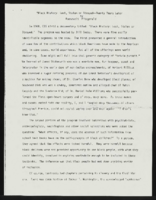
"Black History: Lost Stolen or Strayed -- Twenty Years Later": article draft by Roosevelt Fitzgerald
Date
Archival Collection
Description
From the Roosevelt Fitzgerald Professional Papers (MS-01082) -- Drafts for the Las Vegas Sentinel Voice file. On Black reality not significantly improved 20 years later.
Text
Nevada Consolidated Copper Company Records
Identifier
Abstract
The Nevada Consolidated Copper Company Records (approximately 1887-1978) contain the business records of the company, including correspondence, freight bills, ledgers, maps, leaching data, and books relating to mining. The majority of the records post-date the company's name change to Kennecott Mining Company.
Archival Collection
Hank Castro Music Business Records and Audio Recordings
Identifier
Abstract
The Hank Castro Music Business Records document Hank Castro's career in the music industry in Las Vegas, Nevada from 1969 to 1990. The bulk of the collection consists of original audio recordings from the Las Vegas Recording Studio. The collection also contains legal documents, personal correspondence, and promotional material related to the Las Vegas Recording Studio (1971-1985), songwriter agreements, and sheet music (the majority of the lyrics written by Hank Castro) from artists represented by the Las Vegas Recording Studio and Castro's other companies.
Archival Collection

Jessica Guiao oral history interview: transcript
Date
Archival Collection
Description
Oral history interview with Jessica Guiao conducted by Grecia Lopez on November 22, 2022 for the Reflections: the Las Vegas Asian American and Pacific Islander Oral History Project. In this interview, Guiao recalls her childhood in Hayward, California, and being raised in Las Vegas, Nevada. She recalls not liking the climate of Nevada at first, and describes the friends she has made throughout her time in the city and the identity she has developed. Guiao discusses some of the pressures and stereotypes surrounding Asian Americans, such as what career path they should pursue or the aversion to embracing subcultures, and how she has consolidated her rebellion into her own identity. Throughout the interview, Guiao touches on other topics such as Filipino food, the long-standing history between Mexican and Filipino communities, Catholicism, goth culture, and anti-Asian hate and racism that she and her family has faced.
Text

